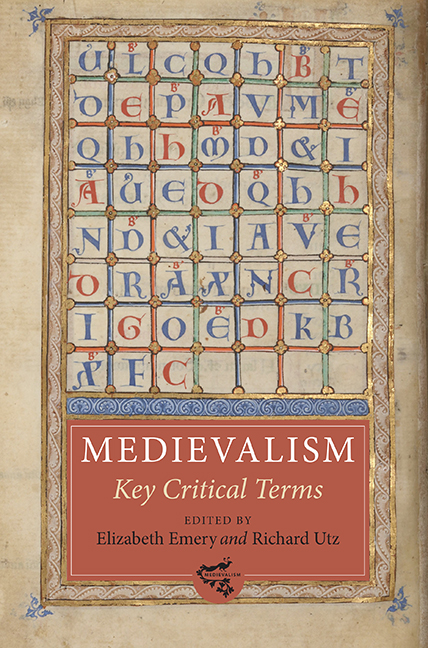Book contents
- Frontmatter
- Dedication
- Contents
- List of Illustrations
- List of Contributors
- Making Medievalism: A Critical Overview
- 1 Archive
- 2 Authenticity
- 3 Authority
- 4 Christianity
- 5 Co-disciplinarity
- 6 Continuity
- 7 Feast
- 8 Genealogy
- 9 Gesture
- 10 Gothic
- 11 Heresy
- 12 Humor
- 13 Lingua
- 14 Love
- 15 Memory
- 16 Middle
- 17 Modernity
- 18 Monument
- 19 Myth
- 20 Play
- 21 Presentism
- 22 Primitive
- 23 Purity
- 24 Reenactment
- 25 Resonance
- 26 Simulacrum
- 27 Spectacle
- 28 Transfer
- 29 Trauma
- 30 Troubadour
- Index
- Medievalism
11 - Heresy
Published online by Cambridge University Press: 08 October 2022
- Frontmatter
- Dedication
- Contents
- List of Illustrations
- List of Contributors
- Making Medievalism: A Critical Overview
- 1 Archive
- 2 Authenticity
- 3 Authority
- 4 Christianity
- 5 Co-disciplinarity
- 6 Continuity
- 7 Feast
- 8 Genealogy
- 9 Gesture
- 10 Gothic
- 11 Heresy
- 12 Humor
- 13 Lingua
- 14 Love
- 15 Memory
- 16 Middle
- 17 Modernity
- 18 Monument
- 19 Myth
- 20 Play
- 21 Presentism
- 22 Primitive
- 23 Purity
- 24 Reenactment
- 25 Resonance
- 26 Simulacrum
- 27 Spectacle
- 28 Transfer
- 29 Trauma
- 30 Troubadour
- Index
- Medievalism
Summary
MORE THAN ANY other term, “heresy” may well signify the quintessential medievalistic moment within the modern popular imagination, conjuring forth visions of D. W. Griffith-like pageants of intolerance, showcasing defiant dissenters at the fiery stake in the name of God, for “purification,” with Carl Orff's music in the background. Such repressive brutality toward heretics, as with witches, lepers, and Jews, also evokes the religious zealotry and irrationalism often associated with the so-called “Dark Ages,” preceding the avowedly more enlightened Renaissance and modern centuries. Examining heresy may offer a prime example of a medieval term useful in understanding our current culture's attitudes toward difference, despite our era's self-image as far more tolerant.
The existence of any type of heresy presupposes some sort of incumbent orthodoxy, whether in religious-philosophical, artistic, or scientific belief systems, from which the heresy born within defines itself by willfully differing in some way. This aspect of perceived choice is crucial: people are not born heretics, they choose to be such. Since the prevailing orthodoxy purports to represent the most correct tenets of its domain, any real challenge to this supremacy, whether by dissenting with or surpassing, constitutes a heresy and not just a renunciation (apostasy) or irreverence (blasphemy) since it de facto threatens that orthodoxy's inherent self-image of perfection, often supported by political power, thus necessitating the heresy's and its practitioners’ expulsion, even destruction, and not merely its refutation. Apparently, the more seductive a heresy's teachings the more ruthless and definitive its persecution by the orthodoxy, whether in religion, science, or the arts. Since many heresies first arose simply by being different, without any rigorously systematic philosophical or theological underpinnings, verbal persecution, in the form of methodically argued written refutations by the early Church Fathers, actually benefited orthodoxy's doctrinal development. Later, however, such efforts to discredit or harass heretics often proved counterproductive – what did not doctrinally/physically kill them made them stronger – back then as today, beyond converts’ initial psychological thrill of “questioning authority” (to use a late 1960s term).
Although the word is used quite freely these days to connote any deviance from any orthodoxy, the original context of the term heresy is religious. When we consider the multitude of heresies throughout the world's religions, those in early and medieval to Renaissance (Reformation) Christian history appear the most seminal in their theological and social impact.
- Type
- Chapter
- Information
- Medievalism: Key Critical Terms , pp. 97 - 108Publisher: Boydell & BrewerPrint publication year: 2014



